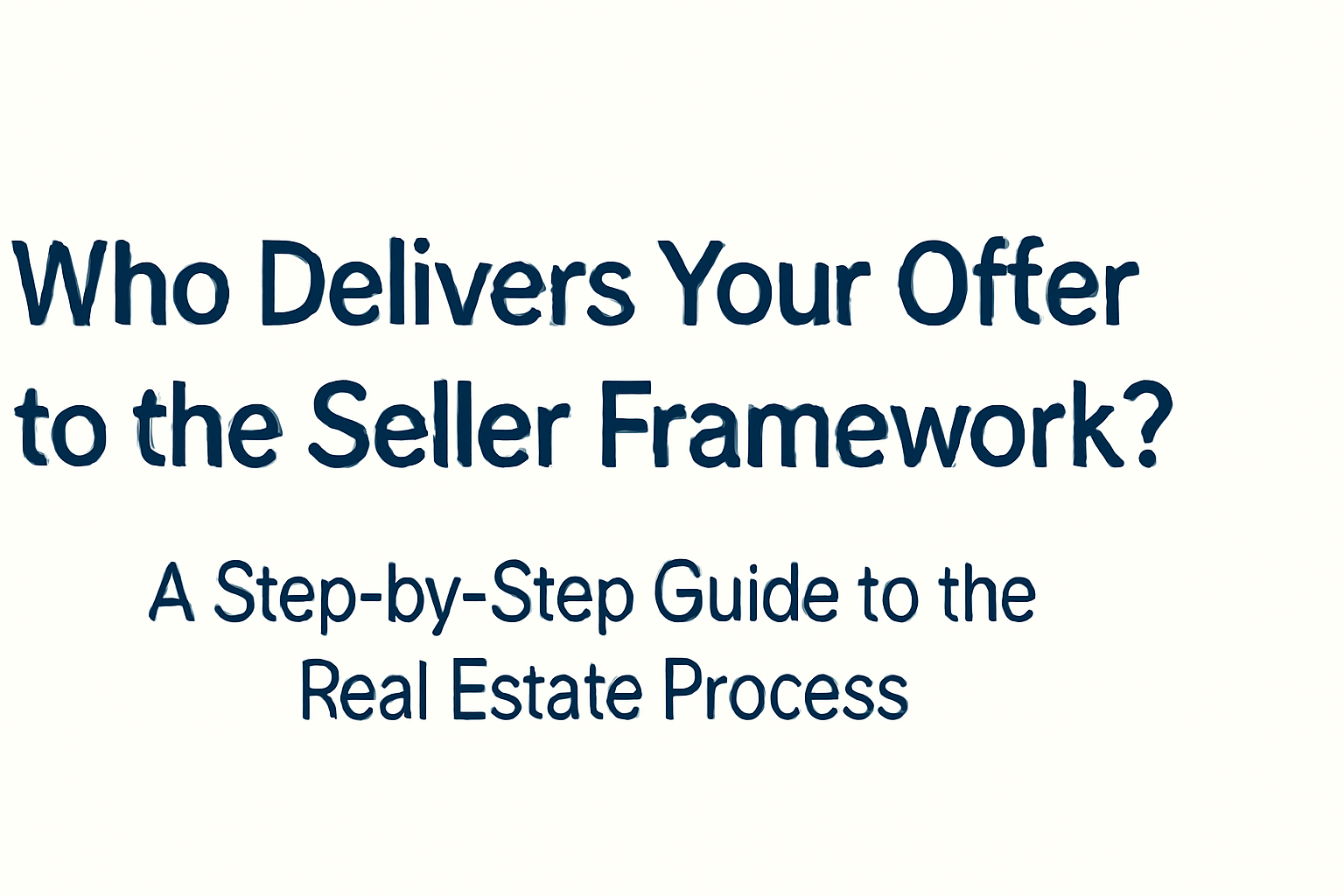Introduction: What is the Offer Delivery Process in Real Estate?
In real estate, submitting an offer on a property is a key part of the buying process. But who exactly delivers your offer to the seller? It’s not always as straightforward as you might think.
When you’re ready to make an offer on a home, you might assume that you directly send it to the seller, but that’s not usually how it works. In most cases, your agent is the one who delivers your offer to the seller’s agent. This process involves more than just handing over a piece of paper; it’s about making sure the offer is received, understood, and presented in the best possible light.
But why does this matter? Well, knowing how the process works can help you avoid common mistakes and give you an edge in a competitive real estate market.
Is it the buyer’s agent or is it the buyer who submits the offer?
In most cases, your agent is the one who submits the offer to the seller’s agent. This ensures that all the legal and professional details are handled correctly. While you, as the buyer, can certainly communicate with the seller, your agent plays a crucial role in formalizing and presenting the offer.
Who is Responsible for Delivering the Offer to the Seller?
When it comes to delivering an offer, the roles of the buyer’s agent and the seller’s agent are crucial. But who exactly is responsible for making sure the offer gets to the seller? The answer might surprise you.
In most transactions, the buyer’s agent is responsible for delivering the offer to the seller’s agent. Why? Because your agent is the one who has a professional relationship with the seller’s agent and knows how to handle all the formalities.
The seller’s agent then takes on the task of presenting the offer to the seller. Sounds simple enough, right? But there’s more to it. The buyer’s agent also ensures that the offer is complete, clear, and contains all the necessary details. Think about it, would you trust an email or text message from someone you barely know over the word of a professional who’s been in business for years? Probably not.
Can a buyer deliver an offer directly to a seller?
While it’s possible for you, as the buyer, to deliver the offer directly to the seller, it’s not common practice. Here’s why: real estate transactions are filled with legal jargon and specific steps. Your agent is equipped to handle this, ensuring your offer is properly presented and that you don’t miss any important steps. Plus, having an agent do the legwork can help prevent any potential miscommunication.
The Role of the Buyer’s Agent in Delivering an Offer
So, what exactly does the buyer’s agent do when it comes to delivering an offer? It’s more than just filling out a form and pressing send. A buyer’s agent plays a key role in ensuring the offer is clear, competitive, and professionally presented.
First, your agent will work with you to understand your offer—how much you’re willing to pay, any contingencies, and your timeline for closing. Then, they’ll draft the offer in a way that aligns with the seller’s preferences, while still protecting your interests. This isn’t something you want to leave to chance. For example, the agent’s experience can make the difference between a competitive offer and one that is overlooked.
Once the offer is ready, your agent ensures it’s delivered to the seller’s agent via secure and formal channels—whether that’s through email, a secure portal, or even in person. It’s all about professionalism.
How does the buyer’s agent ensure the offer is delivered properly?
Your agent doesn’t just send your offer off and hope for the best. They take the time to confirm that the offer was received by the seller’s agent and follow up to ensure it gets to the seller without delays. This can also involve ensuring that any negotiations are handled swiftly to avoid losing out on the deal.
The Seller’s Agent’s Role in Presenting the Offer
Now that the buyer’s agent has delivered the offer, the seller’s agent steps in. Their job? To ensure that the seller receives the offer in a timely manner and fully understands the details. But it doesn’t stop there—the seller’s agent is also responsible for presenting the offer in the best possible light to their client.
The seller’s agent will typically go over the offer, breaking down the financials, contingencies, and any other important terms for the seller. It’s like a translator—they’re making sure that the seller sees the offer as a solid option. In many cases, the seller’s agent will also provide insight into whether the offer is fair and how it compares to other offers (if any).
While it’s the seller’s agent’s job to present the offer, they also act as a middleman in case the seller wants to negotiate or counter. Without this step, things could get messy, and important details could be lost.
Does the seller’s agent always present all offers to the seller?
Yes, the seller’s agent is legally obligated to present all offers to the seller, unless directed otherwise. However, they can also provide their professional opinion on the offer’s strengths and weaknesses. But ultimately, it’s up to the seller to decide whether to accept, reject, or counter the offer.
What Happens After the Offer is Delivered to the Seller?
So, your offer has been delivered, and the seller’s agent has presented it to the seller. Now, what happens? This is where the real fun begins. The ball is now in the seller’s court, and there are a few different directions things can go.
The seller will review the offer with their agent and decide how to respond. The options are straightforward but critical: they can either accept, reject, or counter the offer. Each of these decisions leads to a different outcome, and how the seller responds can significantly impact the deal.
How long does it take for the seller to respond after receiving an offer?
The timeline for a response can varies depending on several factors, such as market conditions and the seller’s situation. In a competitive market, salespeople might respond quickly—sometimes within a few hours or days. In a slower market, it may take a little longer for the seller to decide.
As a buyer, your agent will typically keep you updated on any responses or feedback from the seller’s side.
Common Pitfalls in the Offer Delivery Process and How to Avoid Them
The offer delivery process seems straightforward, but there are several common pitfalls that can trip up even seasoned buyers and agents. Here are a few to watch out for and how to avoid them.
1. Missing Important Details in the Offer
Sometimes, an offer might be missing a key detail, like the correct financing information, or it might not clearly specify contingencies like home inspections. This can lead to confusion and even a rejected offer. To avoid this, make sure your agent double-checks every part of the offer before submission.
2. Timing Issues
Timing is everything. If your offer isn’t submitted quickly enough in a hot market, you could miss out on a great deal. On the flip side, if the offer is rushed without proper preparation, it can lead to mistakes. Your agent should always work with you to set the right deadlines and ensure the offer is timely and competitive.
3. Failure to Communicate with the Seller’s Agent
A buyer’s agent should always keep the lines of communication open with the seller’s agent. Lack of communication can result in misunderstandings or delays. Ensure that your agent follows up with the seller’s agent to confirm receipt and ask any clarifying questions about the offer.
What are the top mistakes to avoid when submitting an offer?
The biggest mistake is rushing the process. Take the time to ensure everything is in order—your offer should be clear, competitive, and well thought-out. Don’t forget to communicate regularly with your agent to ensure nothing is overlooked.
Conclusion: Best Practices for Successful Offer Submission
Now that you know the ins and outs of delivering an offer to the seller, it’s time to put everything into practice. Here are some best practices to ensure your offer is handled professionally and stands out to the seller:
1. Work Closely with Your Agent
Your agent is your key ally throughout this process. Their expertise will guide you in crafting a strong offer, ensuring it’s delivered on time, and helping with negotiations. Stay in constant communication with your agent to stay informed and make any necessary adjustments.
2. Be Clear and Competitive
Make sure your offer is clear and concise, with no ambiguities that could confuse the seller. Include all relevant details like the offer price, contingencies, and timeline. In a competitive market, your offer needs to be attractive, so work with your agent to make sure it stands out.
3. Follow Up
After submitting the offer, it’s important to follow up with the seller’s agent to confirm the offer was received and to keep the momentum going. Your agent will handle most of this, but being proactive ensures there are no surprises.
4. Stay Flexible
Sometimes, things don’t go as planned. Be prepared for counter offers, rejections, or additional negotiations. Stay flexible and trust that your agent will help guide you through the next steps.
By following these steps, you’re setting yourself up for success in delivering your offer to the seller. It’s all about professionalism, communication, and being competitive.
Is it possible to bypass the agent and still submit an offer?
While it’s possible to submit an offer without an agent, it’s not recommended. Real estate transactions involve complex legal terms and formal processes. Having an experienced agent ensures your offer is professionally handled and legally sound. Plus, it can make your offer more appealing to the seller, especially in a competitive market.



